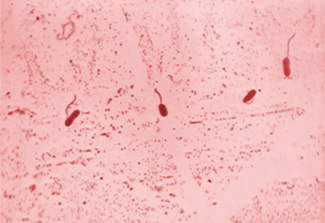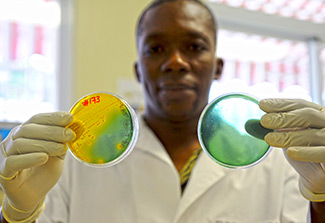GHESKIO combats cholera outbreak during humanitarian crises in Haiti
January/ February 2023 | Volume 22 Number 1
 Photo courtesy CDC The photomicrograph reveals the presence of four flagellated, Vibrio cholerae bacteria.
Photo courtesy CDC The photomicrograph reveals the presence of four flagellated, Vibrio cholerae bacteria.
Health workers in Haiti, facing a resurgence of cholera throughout the country, are making headway against the disease by scaling-up treatment centers, implementing oral rehydration points in high-risk communities, and conducting vaccination campaigns in the regions hit hardest.
Cholera, a diarrheal infection caused by eating food or drinking water contaminated with the
Vibrio cholerae bacterium, is commonly treated with oral rehydration solution. Three WHO pre-qualified vaccines can prevent the disease.
“The big picture is that we are in a better place than we were at the beginning of the outbreak and, while things are still very difficult and very complicated, I think we've made progress,” said Dr. Vanessa Rouzier, Director of Research at GHESKIO, a Haitian-led non-profit. She and her co-author and colleague, Dr. Karine Severe, provided an update to their article, “Resurgence of Cholera in Haiti amidst Humanitarian Crises,” published in the
New England Journal of Medicine in December 2022.
Political chaos, catastrophic shortages
On October 1, 2022, the Haitian Ministry of Health reported a surge in cholera patients in Port-au-Prince. This is more than a decade after the devastating 2010 cholera epidemic which caused more than 10,000 deaths, explained Rouzier, Severe, and co-author Dr. Nadalette Alcenat. The current outbreak coincides with recent political chaos, gang violence, and a blockade of Port-au-Prince’s main port, leading to a “catastrophic shortage of food, potable water, and fuel,” they wrote.
“Today, the political chaos and the gang violence does remain, unfortunately, so we continue to work in a very challenging environment,” Rouzier told Fogarty. “The major difference being that fuel is available, even if it's with some amount of difficulty. It’s available, at least, in the capital city of Port au Prince.”
One negative change in the past few weeks is transmission of the disease has continued. At the time of the NEJM publication, eight out of the total 10 Departments (top level government administrative regions equivalent to states) had been affected, now all 10 Departments and the majority of the island nation’s population are affected, said Severe. A total of 25,182 cases and 496 deaths have been reported as of January 19, 2023.
Severe disease afflicts mostly children
 Photo courtesy USAID The petri dish on the left indicates a positive result for the Vibrio cholerae bacteria at the National Laboratory in Port-au-Prince, Haiti.
Photo courtesy USAID The petri dish on the left indicates a positive result for the Vibrio cholerae bacteria at the National Laboratory in Port-au-Prince, Haiti.
“The majority of people, if they have a good immune system, are able to fight cholera. Only 10% of cases are severe. Children, being so small, are not as resilient and children with malnutrition are the worst off,” said Rouzier. Critical disease more often affects children, but also immunocompromised and malnourished adults compared to healthy adults Common complications of malnutrition, including anemia, combined with diarrhea and dehydration “really just tips you over and you will require prolonged hospitalization,” said Rouzier
Despite challenges and setbacks, progress has been made. With greater access to fuel (at least in the capital), it has been easier to increase the number of cholera treatment centers, which provide care for those who are sick, noted Rouzier. GHESKIO has also begun to implement oral rehydration points, a highly successful intervention from the previous epidemic. “It's within communities and staffed by people from the community. Because its within walking distance, you don't have to leave your area, which is often a challenge for security reasons, so you can start treatment early,” said Rouzier. Oral rehydration points are also a platform from which health professionals can conduct door-to-door sensitization, provide oral rehydration packages (salts) and hygiene kits (with chlorine tablets to decontaminate water) and offer counseling, explained Severe, adding, “It’s important for us to remain very alert to avoid another peak and further spread of this outbreak.”
Vaccines help to stop spread
The vaccination campaign started in December. Despite other cholera outbreaks ongoing in the world, Haiti was able to procure 1.7 million oral vaccines from the International Coordinating Group (ICG) that manages the global stockpile. So far, 1.1 million have been received and are being deployed in the West Department, encompassing Port-au-Prince, and the Center Department. To stretch limited resources from the stockpile, a one dose vaccination strategy is being used, which proved successful in quickly stopping transmission and preventing a resurgence during a previous cholera outbreak triggered by Hurricane Matthew in 2016. The plan is to use inoculations over an ever-widening geographic area to limit disease spread and get as close to eradication of cholera as possible, noted Rouzier.
“Dr. Glass has been amazing with helping us lobby for the vaccine. His advocacy goes a long way in a country struggling to get things moving in the right direction,” said Rouzier. Severe noted the sensitization campaign, promoting messages for prevention and uptake of the vaccine, is on-going.
Finally, GHESKIO plans to partner with Agence Française de Développement, which has offered support at cholera epicenters requiring sanitation measures. This project is looking to collaborate with local mayoral offices on trash removal, cleaning of sewage systems in canals, and mobilizing the community to help decrease contamination and create access to safe water.
More information
Updated February 13, 2023
To view Adobe PDF files,
download current, free accessible plug-ins from Adobe's website.
Related World Regions / Countries
Related Global Health Research Topics